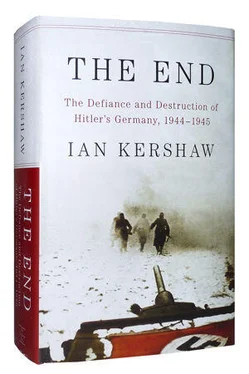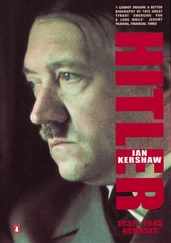As the end neared, and central government fragmented almost completely, life-and-death decisions passed ever further down the hierarchy to the regional, district and local levels to the point that individuals like the military commandant in Ansbach acquired arbitrary and lethal executive power. But this radicalization at the grass roots, crucial though it was to the mounting irrationality of the final phase, would have been impossible without the encouragement, authorization and ‘legitimation’ provided from above, from the leadership of a regime in its death-throes facing no internal challenge.
Perhaps the most fundamental element in trying to find answers to the question of how and why the regime held out to the point of total destruction revolves, therefore, around the structures and mentalities of ‘charismatic rule’. Linking such an approach to a differentiated assessment of the ways in which ordinary Germans responded to the rapidly gathering Armageddon offers the potential to reach a nuanced assessment of why Nazi rule could continue to function to the end.
The chapters that follow proceed chronologically, beginning with the aftermath of the failed bomb plot of 20 July 1944—a caesura in the governmental structures of the Third Reich—and extending to the capitulation on 8 May 1945. By combining structural history and the history of mentalities, and dealing with German society from above and below, the narrative approach has the virtue of being able to depict in precise fashion the dramatic stages of the regime’s collapse, but at the same time its astonishing resilience and desperate defiance in sustaining an increasingly obvious lost cause. The focus throughout is exclusively on Germany: what the Allies, often puzzled themselves by the German willingness to carry on fighting under hopeless circumstances, were thinking, planning and doing forms no part of the analysis. Of course, this was scarcely unimportant for the course of the war, and what happened on the battlefield in the various theatres of war was ultimately decisive. But this is no military history, and the relevant stages of the Allied advance on Germany, east and west, are tersely summarized, primarily in order to provide a framework for the subsequent assessment.
Since we know the end of the story, it is hard not to ask why contemporaries did not see as obviously as we do in retrospective: that the war was plainly lost, at the absolute latest by the time the western Allies had consolidated their landings in France and the Red Army had advanced deep into Poland in the summer of 1944. But, until surprisingly late, that was not how they did see it. Certainly, they knew that the great vistas of 1941–2 could not be realized. But the German leadership, not just Hitler, thought there was still something to be gained from the war. Strength of will and radical mobilization, they thought, could prolong the conflict until new ‘miracle weapons’ came along. The war effort would be sustained so far that the Allies would look for a negotiated way out of mounting losses as advances were blocked or reversed. A split between east and west would materialize, and Germany would still be able to hold on to some territorial gains and, eventually with western aid, turn against the common enemy of Soviet Communism. Such hopes and illusions, if harboured by a rapidly dwindling number of Germans (especially once the Red Army reached the Oder in late January 1945), lingered almost to the end. So even in the final, terrible phase of death and devastation, faced with insuperable odds, the fight went on amid a mounting series of regional collapses, driven by increasingly irrational but self-sustaining destructive energy.
Trying to explain how this could be so—how the regime, torn apart on all sides, could continue to operate until the Red Army was at the portals of the Reich Chancellery—is the purpose of this book.
It takes a bomb under his arse to make Hitler see reason.
Joseph Goebbels, 23 July 1944 1
It was the beginning of the end for the Third Reich. By late July 1944, the D-Day landings of the western Allies that had taken place in Normandy on 6 June 1944 had been consolidated. Troops and arms were being shipped over to the Continent in ever greater numbers. Direct ground attack on the Reich itself was now in prospect. On the eastern front, the Red Army, in its massive offensive ‘Operation Bagration’, launched just over a fortnight after D-Day, had smashed through the defences of the Wehrmacht’s Army Group Centre (an immense formation of 48 divisions, in four armies, and pivotally placed over a 700-kilometre stretch of the enormous front), inflicting huge losses, and had advanced more than 300 kilometres. To the south, Rome had fallen to the Allies and German troops were engaged in fierce rearguard fighting near Florence. Meanwhile, ever more German towns and cities were exposed to relentless devastation from the air. With resources and manpower stretched to the limit and hugely inferior to the combined might of the enemy, now forcing back the Wehrmacht from the east, west and south, the writing was on the wall for the Hitler regime.
At least, that was how the western Allies saw it. They were confident that the war would be over by Christmas. 2Viewed from Germany, it was a different matter. Here, attitudes about the state of the war and Germany’s prospects varied widely, whether at the elite level, among the civilian and military Reich leadership, or among the public on the ‘home front’ and the millions of men under arms. Defeatism, reluctant acceptance that the war was lost, realistic acknowledgement of overwhelming enemy strength, waning belief in Hitler, and fears for the future were more evident by the day. On the other hand, support for the regime, not just among Nazi fanatics, was still widespread. And many in high places and low still refused to contemplate the prospect of defeat. Their thinking ran along the following lines. The enemy—the unholy coalition of the western democracies and the Communist Soviet Union—could still be repulsed if the war effort could be revitalized; in the event of a serious reverse, the enemy could split apart; new, devastating weapons were on the way and would bring a sharp turn in war fortunes; and, if subjected to significant military setbacks, the Allies would be forced to entertain a settlement, leaving Germany some of her territorial gains and peace with honour. Such thoughts were by no means moribund in the summer of 1944.
Among the mass of the population, however, the predominant feeling in mid-July 1944 was one of mounting worry and anxiety. Whatever their carefully couched criticisms of the regime’s leaders (including Hitler himself) and, in particular, of the Nazi Party and its representatives, the great majority of ordinary citizens were still unhesitatingly loyal in their support for the war effort. The mood was anxious, not rebellious. There was no trace of anything similar to the growing unrest that eventually burst into open revolution in 1918, despite Hitler’s pathological fixation with the internal collapse of that year. There were contingency plans to cope with the possibility of an uprising by foreign workers (numbering by this time, together with prisoners of war, more than 7 million). But there was no serious expectation of revolution by the German population.
Regional reports of the SD ( Sicherheitsdienst ; Security Service) indicated an increasingly apprehensive mood, falling to ‘zero point’, producing ‘deep depression’, and amounting to an ‘anxiety psychosis’ and ‘creeping panic’, in the light of the Red Army’s advance in the east. There was intense worry about the likely fate of East Prussia. People feared that, once on German soil, the Russians would never be forced out. Women in particular were profoundly apprehensive. ‘The eastern front will probably soon collapse,’ ran one reported comment. ‘If the Bolsheviks get in, we might as well all hang ourselves, with our children. The Führer should make peace with England and America. The war can no longer be won.’ It was not an isolated sentiment.
Читать дальше












